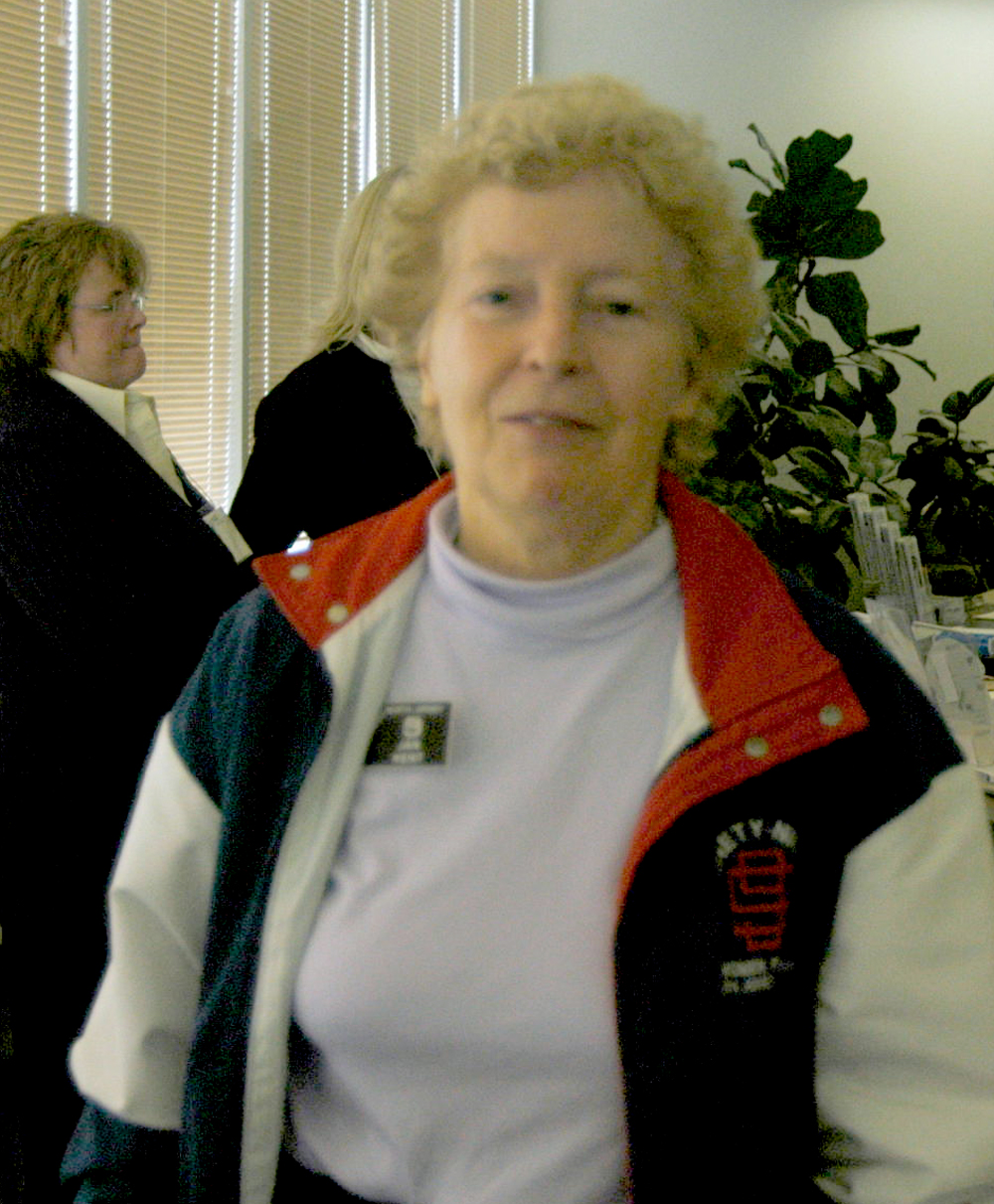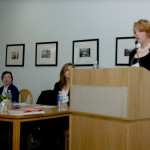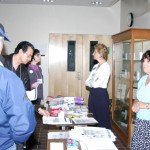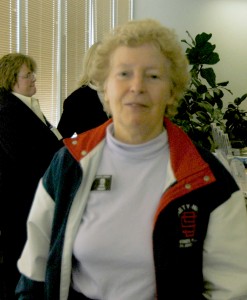
Jaeanne Kent started the student pilot forum 18 years ago. She believes that new pilots need correct information early on in their flying careers.
By Henry M. Holden
The questions are always the same from student pilots. “What FAA regulations must I learn?” “How many hours do I need to get my private pilot license?” “I don’t like my flight instructor; what do I do?” “What if I need to take a break from flight training?”
Eighteen years ago, Jaeanne Kent, a member of the Ninety-Nines, decided to develop an annual student pilot safety forum to provide the answers to these and the dozens of other questions new student pilots have. The North Jersey chapter of the Ninety-Nines has sponsored this event since then.
Instead of auditorium-like presentations as in past years, Nancy Ahlers, chairperson of the forum, arranged for the event to be held at the County College of Morris in Randolph, N.J., on March 31. Because of the extra room this year, organizers were able to invite representatives from several flight schools in the area. They also had the facilities for several breakout sessions with topics including sample ground schools, shopping for a flight school, dealing with air traffic control and an advanced in-depth session on electrical system failures.
“Because of CCM, we were able to reformat the forum and deliver more information to those who attended,” said Ahlers. “Holding it on a Saturday also brought more people out.”
Forum panel members included flight instructors, a member of the Civil Air Patrol, a Federal Aviation Administration examiner, a medical examiner, an air traffic controller and an insurance representative. The event allowed students and licensed pilots to get into the minds of the people behind the scenes, to help them navigate their way through aviation.
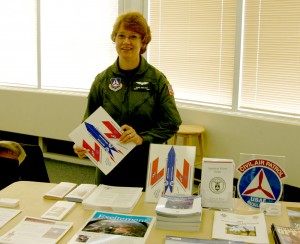
Captain Carol McCloud represented the New Jersey Civil Air Patrol. Founded more than 60 years ago, CAP is an auxiliary of the U.S. Air Force.
Along with dispersing information, the Ninety-Nines also helped promote CCM’s two-year aviation program.
“We’ve had a two-year professional pilot program here for 10 years,” said Professor Venny Fuentes, PE. “The students do their flight training at local flight schools, and we do the ground theory here on campus. We welcome anyone who wishes to mix aviation with their college training.”
At the forum, attendees found out that finding the right flight instructor isn’t the only step towards learning how to fly. Ahlers said that finding the right flight school is also important.
“Each school has its own personality, so you need to find one that fits with yours,” she said. “Visit at least three flight schools. Make sure you’re comfortable with your surroundings. Look at the school’s equipment; it doesn’t have to be brand new, but if they don’t take the time to make sure the equipment is clean and well-maintained, that theme will probably carry through all of your training.”
Ahlers advised potential pilots to also check out the flight school’s staff, as well as the flight instructors.
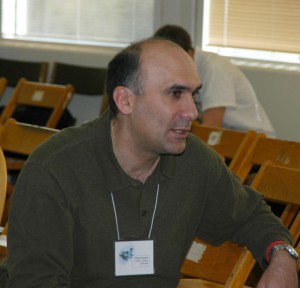
Professor Venny Fuentes is the department chairperson of the engineering technologies and science department at the County College of Morris in Randolph, N.J. He’s head of the Aviation Flight Technology program.
“Look around,” she said. “Is the staff happy? Do they greet you with smiles? Do they look like they enjoy being there? If they do, they’ll provide much better service than people who aren’t so happy with their jobs. Look for an instructor with a sense of humor, because that airplane’s like a really small classroom. You’re going to be spending a lot of time and money on this venture, so have fun.”
Ahlers advises that students should prepare for each flight lesson the night before.
“Be prepared mentally and physically, and get a good night’s sleep,” she said. “Then your head’s in the right place.”
Some students don’t know what to do if they need a break in training.
“Keep coming to the airport anyway,” said Ahlers. “Hang out with your new friends, and do some hangar flying. Some of the pilots will probably take you along for rides. Immerse yourself in aviation. Join the Aircraft Owners and Pilots Association, the Experimental Aircraft Association, the Ninety-Nines and other aviation groups. They’re all going to be behind you, providing a great support system.”
Panel member Gary Evenson, FAA controller, described some of the communication challenges facing students.
“Students often have issues just communicating with the tower,” said Evenson. “First, they might be intimidated by the radio, and then their transmissions may get stepped on by other pilots. Listening is just as important as talking. Be patient. Wait for a pause, repeat your call and be brief. If you missed something because of static or noise, don’t say, ‘Can you repeat that, please?’ Just say, ‘say again.’ Keep it short. It makes a big difference when the traffic is heavy.”
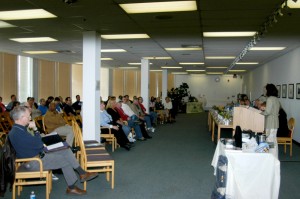
The forum brought an enthusiastic group of about 70 aviation enthusiasts, both new and seasoned. During the question-and-answer periods, topics ranged from getting a light sport aircraft license to the requirements for an air transport rating.
Forum speaker Dr. Gilbert B. Mandel is a former Air Force captain and chief of flight medicine at Wright-Patterson Air Force Base, in Dayton, Ohio. He specializes in internal medicine and cardiology and is currently a chief aviation medical examiner. He advised on medical issues.
“Have your eyes checked before you come to see me for your medical,” said Mandel. “If you fail the eye test, it will seem like forever to clear the paperwork through Oklahoma City. It takes less than an hour for an eye exam, and it will avoid months of delay getting you in the air.”
This forum provided a place where those interested in general aviation could easily and informally discuss concerns and get answers. Whether it’s choosing the right flight instructor or understanding your place in the sky, the Ninety-Nines are always careful to remind students that it’s all about safety. And the Ninety-Nines walk the walk; they have co-sponsored more than 75 percent of the FAA pilot safety programs in the U.S.
- Nancy Ahlers, forum chairperson, addresses the audience prior to the breakout sessions. Listening, from left, are panel speakers Dr. Gilbert Mandel, Angela Kovacs and Christina Santiago.
- L to R: Bev Ewintraub, North Jersey Ninety-Nines chapter secretary; Marilyn Patierno, vice chair; and Marion Starer, chair, register attendees for the forum. The event attracted a mix of both men and women, all with aviation in their blood.











